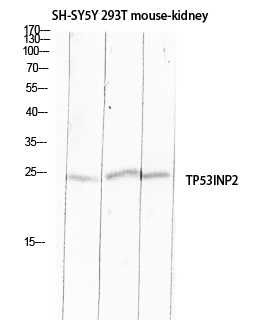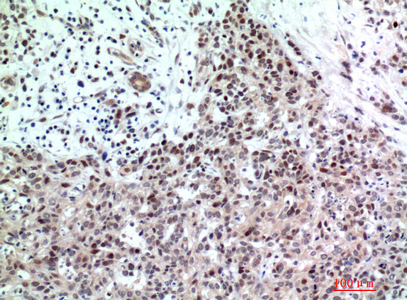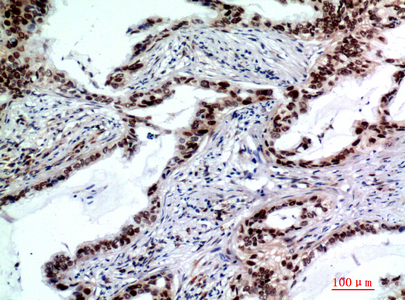


| WB | 咨询技术 | Human,Mouse,Rat |
| IF | 咨询技术 | Human,Mouse,Rat |
| IHC | 1/50-1/100 | Human,Mouse,Rat |
| ICC | 技术咨询 | Human,Mouse,Rat |
| FCM | 咨询技术 | Human,Mouse,Rat |
| Elisa | 1/10000 | Human,Mouse,Rat |
| Aliases | TP53INP2; C20orf110; DOR; PINH; Tumor protein p53-inducible nuclear protein 2; Diabetes and obesity-regulated gene; p53-inducible protein U; PIG-U |
| Entrez GeneID | 58476 |
| WB Predicted band size | Calculated MW: 24 kDa; Observed MW: 24 kDa |
| Host/Isotype | Rabbit IgG |
| Antibody Type | Primary antibody |
| Storage | Store at 4°C short term. Aliquot and store at -20°C long term. Avoid freeze/thaw cycles. |
| Species Reactivity | Human |
| Immunogen | The antiserum was produced against synthesized peptide derived from the C-terminal region of human TP53INP2. AA range:161-210 |
| Formulation | Purified antibody in PBS with 0.05% sodium azide,0.5%BSA and 50% glycerol. |
+ +
以下是关于TP53INP2抗体的3篇参考文献,包括文献名称、作者及摘要内容的简要概括:
---
1. **文献名称**:*"TP53INP2/DOR functions as a transcriptional co-regulator of p53 and modulates autophagy"*
**作者**:Maiuri, M.C. et al.
**摘要内容**:该研究通过免疫共沉淀和免疫荧光技术,利用特异性TP53INP2抗体揭示了其在p53信号通路中的双重作用。结果表明,TP53INP2既参与DNA损伤应答,又通过调控自噬相关基因表达影响细胞稳态。
2. **文献名称**:*"A novel role for TP53INP2 in selective autophagy pathways"*
**作者**:Gonzalez-Polo, R.A. et al.
**摘要内容**:研究使用TP53INP2抗体进行Western blot和免疫组化分析,发现该蛋白通过与LC3蛋白互作,调控选择性自噬过程,尤其在清除泛素化蛋白聚集体中起关键作用。
3. **文献名称**:*"Development and validation of a monoclonal antibody against human TP53INP2 for cancer biomarker studies"*
**作者**:Chen, Y. et al.
**摘要内容**:本文报道了一种高特异性抗TP53INP2单克隆抗体的开发,并通过ELISA、免疫印迹验证其灵敏度。该抗体成功应用于肝癌组织样本检测,显示TP53INP2低表达与患者预后不良相关。
---
以上文献均涉及TP53INP2抗体的实验应用,涵盖基础机制研究(如自噬、转录调控)及临床诊断开发方向。如需具体文献链接或补充更多研究,可进一步提供检索关键词。
The TP53INP2 (Tumor Protein 53 Inducible Nuclear Protein 2) antibody is a tool used to detect and study the TP53INP2 protein, a multifunctional regulator involved in critical cellular processes. TP53INP2. also known as DOR (Diabetes- and Obesity-Related protein), is ubiquitously expressed and localizes to both the nucleus and autophagosomal compartments. It plays dual roles in autophagy and transcriptional regulation. As a autophagy modulator, TP53INP2 facilitates autophagosome formation by interacting with LC3/GABARAP proteins, linking autophagy to cellular stress responses and homeostasis. Additionally, it regulates gene expression by interacting with transcription factors like p53 and thyroid hormone receptors, influencing cell proliferation, apoptosis, and metabolism.
TP53INP2 antibodies are widely used in techniques such as Western blotting, immunofluorescence, and immunohistochemistry to investigate its expression patterns, subcellular localization, and interaction networks. Research has implicated TP53INP2 in diseases including cancer, neurodegenerative disorders, and metabolic syndromes, where its dysregulation correlates with pathological processes. For instance, reduced TP53INP2 levels are observed in certain cancers, suggesting a tumor-suppressive role. Commercially available TP53INP2 antibodies are typically developed in hosts like rabbits or mice, with validation data confirming specificity for targeted epitopes. These reagents are critical for exploring TP53INP2's context-dependent functions and its potential as a therapeutic target in autophagy-related diseases.
×